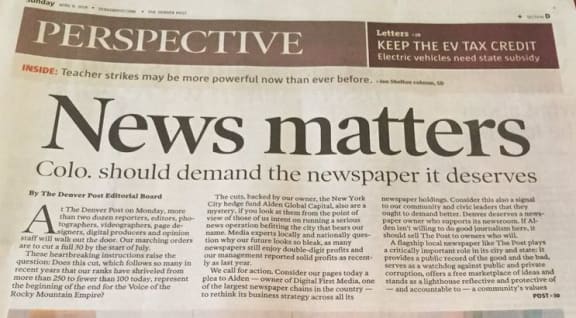Fed up with years of cuts administered by its owners, The Denver Post’s staff told them to get lost this week - in the pages of their own paper. A former Denver Post editor tells Mediawatch why - and what happened next.

A photo of Denver Post staff in 2013 after the paper won a Pulitzer prize. Those in black have left the paper or been made laid off in the past five years. Photo: screenshot
One day before about two dozen journalists were due to walk out of The Denver Post in the latest in a series of cost cutting lay-offs, the paper’s Sunday edition carried a series of articles setting out just how it owners have been running it into the ground.
It included a striking picture of the newsroom's journalists celebrating a Pulitzer Prize win in 2013 - with those who have been fired or laid off since then rendered in black.
There weren't many warm bodies in living colour left in between the black silhouettes.
The editorial last Sunday was effectively a call to the owners of the business - New York-based hedge fund Alden Global Capital - to get out of it.

The Denver Post's op-ed pages last Sunday. Photo: supplied
"Denver deserves a newspaper owner who supports its newsroom. If Alden isn't willing to do good journalism here, it should sell The Post to owners who will," it said.
Bold call.
The New York Times reported that the Denver Post's opinion editor Chuck Plunket did not warn executives at the parent company about the blast they were about to cop in his pages. He even left the paper's chief editor out of the loop.
Super bold call.
"But if that means that I lose my job trying to stand up for my readers, then that means I'm not working for the right people anyway," he told the New York Times.
One of the pieces in the Denver Post last weekend in support of the paper’s campaign against its owners was by former editor Jeffrey A Roberts.
He set out several occasions where the papers investigative reporting had made a big difference - and how they’d miss it if or when the paper folds for good.
"Chuck Plunket felt like he had nothing to lose at this point. The hedge fund owners really do not seem to have any interest in the journalism the paper has produced for more than 100 years. It is interested in taking profits from the paper and cutting staff to the bone - and beyond," Jeff Roberts told Mediawatch.
He also pointed out that the parent company of the Denver Post, through its subsidiary Digital First Media, is one of the biggest owners of newspapers in the US. It has a similar strategy at San Jose's Mercury-News, the Orange County Register, the Boston Herald and other papers, he said.
But why would the owners do that to their own assets?

Jeff Roberts Photo: supplied
"Cutting the staff makes the profit margin bigger. Alden has used profits from its news assets to fund other assets and investments," he said.
"My impression is they will continue to do this for as long as it makes financial sense for them to do it. The Denver Post is a money-making venture despite all that we have heard about the newspaper industry and the loss of ad revenue," he said.
In his article, Jeff Roberts says a local radio reporter recently asked state lawmakers about recent layoffs at The Denver Post.
“Hey, that means we can do whatever we want,” one replied in jest.
Jeff Roberts says comedian John Oliver made a similar observation in a report about the decline of local papers in the US.
“Not having reporters at government meetings is like a teacher leaving her room of seventh-graders to supervise themselves. Best case scenario? Brittany gets gum in her hair. Worst case scenario? You no longer have a school."
"There's definitely truth in that," says Jeff Roberts.
While Colorado's biggest paper is shrinking, the economy and the population of the state - and the metropolis of Denver - are growing fast.
"What isn't being covered is what I worry about. There are a lot of stories that just don't get told," says Jeff Roberts.
But are his efforts to alert people to the danger of this democratic deficit falling on deaf ears?
Many of the online readers' comments responding to the Denver Post's forceful editorial are negative.
"There are alternatives that may not be perfectly fair and balanced but are more fair and balanced. Why pay for the Post when those alternatives are free?" asks one reader.
"Personally, I can’t justify paying for a subscription that supports their blatant activism. I just want balanced news," says another.
Jeff Roberts believes it is not a fair verdict on the Denver Post's journalism, but it is a symptom of a polarised US society coupled with the accelerating decline in people's trust in the US, which has been starkly recorded in survey after survey.
Media scholars are now studying the political effect of so-called "news deserts" in parts of the US.
A recent Politico analysis found that in the 2016 US election, Donald Trump performed best in areas with the fewest newspaper subscribers. Drawing on data from The Alliance for Audited Media, its authors say “the results showed a correlation between low subscription rates and Trump’s success.”
New analysis shows #Trump swamped America's "news deserts" — places lacking in trusted news sources, with fewer-than-average news subscriptions. His popularity fell dramatically in places with higher-than-average news subscriptions https://t.co/ejDy7FjJtG @shawnmusgrave pic.twitter.com/9BDNJCxFtV
— David Beard (@dabeard) April 9, 2018
Jeff Roberts isn't convinced.
"In this day and age people have become 'silo-ed.' They get a lot of news from outlets that may have a slant. They may view a paper like the Denver Post as having a slant too. The editorial pages of the paper have been critical of President Trump, but it is the job of a paper to call out people in power when they fell it is necessary," he said.
Will the Denver Post’s extraordinary whistle-blowing edition last weekend make a difference?
"There is a ray of hope. A group of local investors is trying to get the money together to buy the paper. We'll see what happens," he said.

